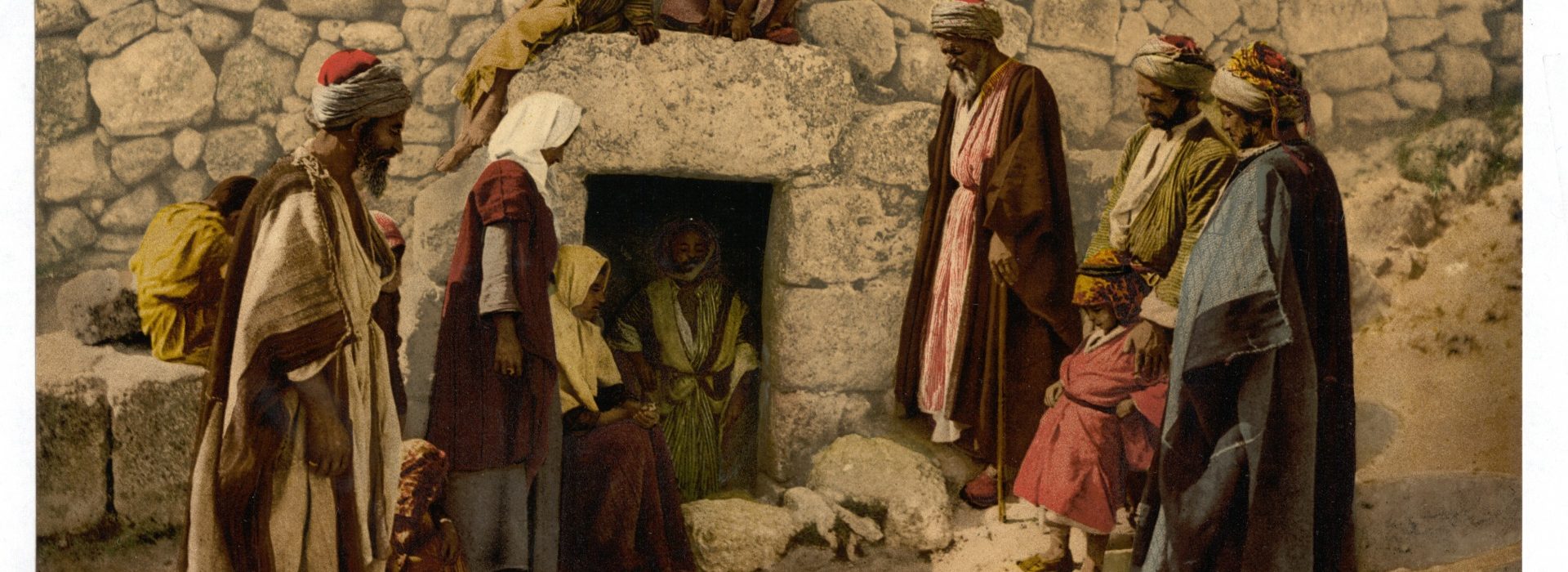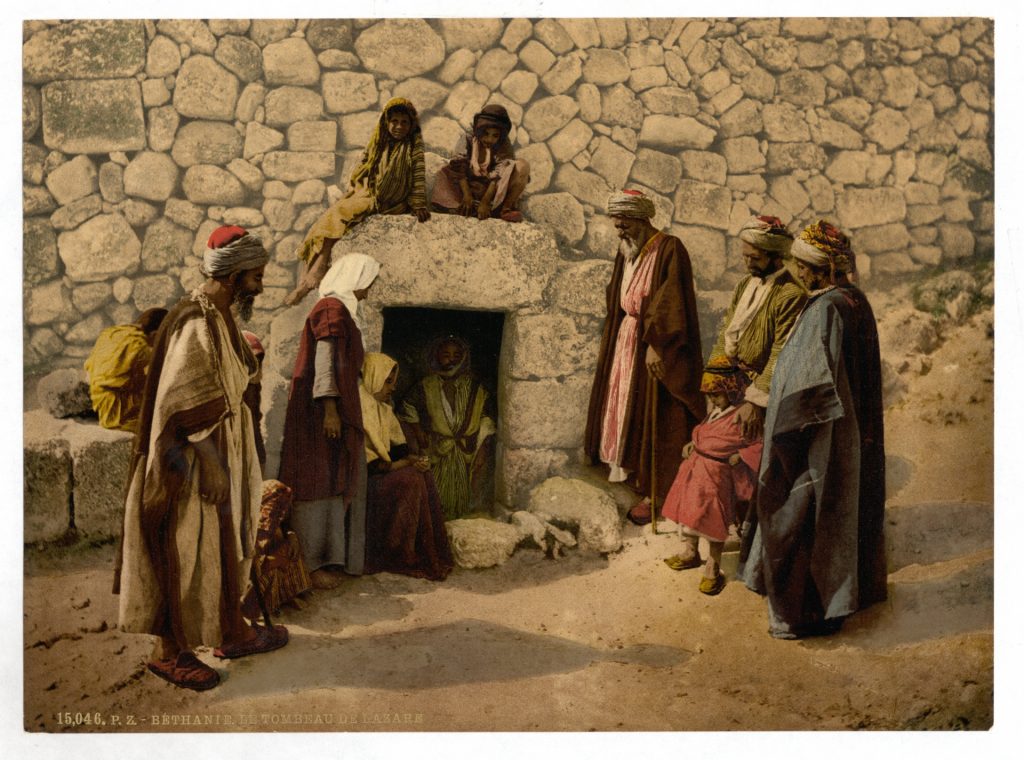March 31, 2020 // Bishop's Column: In Truth and Charity
Jesus, the Resurrection and the Life, defeats the virus of sin and overcomes the rule of death
The following homily was given by Bishop Kevin C. Rhoades March 29, 2020, on the Fifth Sunday of Lent, during a livestreamed Mass at the Cathedral of the Immaculate Conception, Fort Wayne.
On this fifth Sunday of Lent, we hear the account of the greatest sign of Jesus’ public ministry: He brings Lazarus, who has been dead for four days, back to life. This miracle reveals Jesus’ divine power over life and death. We hear this amazing story at a time when we need to hear it — during this coronavirus pandemic, when thousands of people have died around the world and the deadly virus continues to spread, threatening the lives of many others.
There’s a detail at the beginning of today’s Gospel that makes me think of the fortitude and courage of our doctors, nurses, health care workers and first responders during this pandemic. They enter into situations of danger to care for those who are suffering. Jesus went into a situation of great danger when he went back to Judea to be with Martha and Mary and to awaken his friend Lazarus. The disciples warned him about this danger. They said to Him: “Rabbi, the Jews were just trying to stone you, and you want to go back there?”
Yes, Jesus wanted to go back there. He is the Good Shepherd who lays down His life for the sheep. Our Lord courageously headed into danger to help Lazarus, to bring him back to life. Next Sunday, Palm Sunday, we will hear what happened because Jesus went back to Judea. He would be arrested. He would lay down His life and embrace death so that we can receive life.
Many medical workers around the world have contracted the coronavirus because they were dedicated, despite the risk, to care for their patients. Let us pray for them and for all those who continue to face danger, yet courageously do so because of their selfless commitment to the sick and the dying.
Notice in the Gospel that after Jesus said to the disciples: “Let us go to Lazarus,” the apostle Thomas said to the other disciples: “Let us also go to die with Jesus.” By faithfully following Jesus, the disciples head into the same dangerous situation with their Master.
I read this past week of a doctor who was asked by a reporter about entering into a hospital to care for his patients in a situation where there was a shortage of protective gear for the doctors. He said he did his best to protect himself with homemade gear. He told the reporter that he could not ‘not serve’ his patients, despite the risk. This doctor, like so many others, had the Holy Spirit’s gift of fortitude, of courage. Motivated not only by duty, but by love, he was ready to lay down his life for his patients.
I also heard about a nurse caring for coronavirus patients. She was asked about how she was doing and if she was afraid. She replied that she often prays silently in her heart as she moves from patient to patient words spoken by her patron saint, St. Joan of Arc: “I am not afraid. I was born to do this.”
Besides health care workers, there are the priests who also enter into danger to anoint and bring Viaticum to the sick and dying. You may have read the in the news that over 60 priests in Italy (20 from one diocese alone) have died from the coronavirus, many because they were faithfully and courageously ministering to the sick and dying. They, like so many health care workers, entered into danger because of their vocation to love and care for those who are suffering.
In His dialogue with Martha, Jesus makes a great proclamation of His identity. He says to her: “I am the resurrection and the life; whoever believes in me, even if he dies, will live, and everyone who believes in me will never die.” Then he asks Martha if she believes this. Martha makes a beautiful profession of faith: “Yes, Lord, I have come to believe that you are the Christ, the Son of God, the one who is coming into the world.” Jesus asks all of us today this same question: “Do you believe this? Do you believe that I am the resurrection and the life?” May the Lord bless us with the gift of faith during this time so that we may respond with Martha; ‘Yes, Lord, I believe.”
What does this faith in Jesus as “the resurrection and the life” mean? Jesus is talking about another realm of existence. We are very focused these days on the realm of physical, earthly life. The word in Greek for this kind of life is “bios” from which we get the word “biology.” Jesus resuscitated Lazarus. By the power of Jesus, Lazarus returned to biological life. This is the realm of life that is threatened by the coronavirus. Scientists are working tirelessly to confront this threat by developing viral medicine and a vaccine to fight and defeat the virus and protect life. Now, when Jesus speaks of Himself as the resurrection and the life, He is speaking about another realm of life. He doesn’t use the word “bios.” He uses the word “zoe.” Zoe means more than biological life. It is a different plane. The realm of biology always involves death. Jesus opens up the realm of a life that is not restricted by biology: definitive life, life that has left behind the rule of death. It is the life we will celebrate at Easter, the life of the Resurrection, the life that never ends. It is the life St. Paul is talking about in today’s second reading from his letter to the Romans where he writes: “If the Spirit of the One who raised Jesus from the dead dwells in you, the One who raised Christ from the dead will give life to your mortal bodies also, through His Spirit dwelling in you.”
During this pandemic, when so many are working tirelessly to fight and defeat the coronavirus and to preserve biological life, let us also remember that there is an even more destructive virus out there. It is the virus that attacks the definitive life that Jesus gives us. That virus is sin. It is a virus that is defeated by grace and by love. It is the virus that is conquered on the cross. And the death that the virus of sin causes is defeated when Jesus rises from the dead, something infinitely greater than the resuscitation of Lazarus. That’s why the early Christians would sing these words quoted by St. Paul: “Death is swallowed up in victory. Where, O death, is your victory? Where, O death, is your sting?”
My brothers and sisters, because of Jesus, death does not have the last word. Life has the last word. That life we received at our Baptism. It is life without end. When we encounter Christ, we enter into communion with that life. We are in touch with true life, beyond our biological life. We come into contact with that life when we receive the drug of immortality, the antidote to death, the Holy Eucharist, the bread of life. During this time, we long for that day when all will be able to receive again this medicine of immortality. In the meantime, the Lord invites us to live the Eucharist through prayer, love and service.
Finally, I invite you to meditate on these words of Jesus: “I came that they may have life and have it abundantly.” One thing we can hopefully learn from this pandemic and its economic toll is that life in abundance is not what so many tend to think. It’s not about having everything, material comforts and pleasures or being able to go out and do whatever we want. Hopefully, all will learn that we don’t live for inanimate things or for things that pass away. If we do, we live for death. As disciples of Jesus, we live for life, true life, the abundance of life. We live for communion with the infinite love which is the source of life: communion with the Most Holy Trinity through our communion with the One who is the Resurrection and the Life. He stretches out His hand to us during this pandemic. Let us take His hand and live the abundance of life He gives and communicate that life to our neighbors!
The best news. Delivered to your inbox.
Subscribe to our mailing list today.







